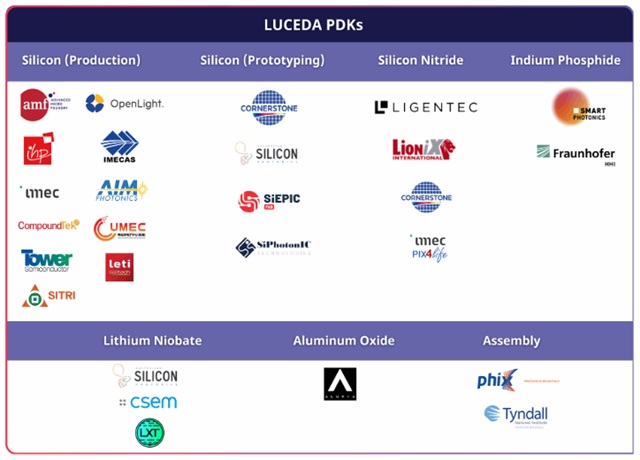As AI development has become more demanding regarding data transmission speed and bandwidth, the vast potential of photonic ICs (PIC) has recently grabbed industrial attention, especially in data center applications. The CMOS-compatible silicon photonics (SiPh) is in the spotlight due to its scalability. Co-Packaged Optics (CPO), namely the heterogeneous integration of optics and silicon on a single packaged substrate, is another related development gaining traction amid the high-performance computing (HPC) hype.
Luceda Photonics, a Belgium-based company offering software and services for photonic IC design, is at the heart of this revolution. Founded in 2014 as an Imec spinoff, the company offers the photonics design tool Luceda IPKISS, which envisions providing the photonic chip design industry the same convenience available to the electronic IC design sector.
In contrast to major EDA vendors, which have limited expertise in photonics design, Luceda, according to company Co-Founder & CTO Pieter Dumon in an interview with DIGITIMES Asia, provides a full design flow for photonic IC that includes a lot of pre-defined algorithms for routing, layout, and simulation. In essence, Luceda's design software automates and integrates all aspects of photonic design flow, including component design, circuit design, and design validation, in one tool based on Python language and enables the sharing and re-using of photonic design IPs.
The design tool IPKISS also includes an IP Manager module that tests and validates photonic IP building blocks alongside an Arrayed Waveguide Gratings (AWG) designer. Additionally, Luceda also boasts a wide range of foundry process design kits (PDKs) spanning various material platforms such as silicon, silicon nitride (SiN), indium phosphide (InP), and aluminum oxide.
Notably, beyond PDKs, the Luceda CTO also pointed to Assembly Design Kits (ADKs) as a new area where the company sets foot, as the chip design process has to factor in packaging and assembly. For example, Luceda has begun to make ADKs that consider assembly and packaging rules and modules. For now, the company's ADKs are accessible through the Netherlands-based photonics assembly service provider PHIX and the Ireland-based ICT hardware research center Tyndall National Institute.
Regarding the role AI plays in design assistance, Dumon indicated that Luceda has conducted relevant experimentations, but the technology is not mature enough yet except for simple applications. However, the CTO is confident that AI will play a role in photonics design due to the current rate of progress.
One design flow that includes photonics increasingly on demand
Though the photonics industry is gaining traction, the lack of standardization is a challenge often repeated by industry players. Dumon, likewise, brought up the issue, especially noting the lack of reliable simulation models in a sector that's still relatively young. Another challenge, according to him, is the different requirements arising from a wide variety of applications. Especially when it comes to electronic and photonic integration, the CTO noted that no one approach suits all use cases. Nevertheless, for chiplet and CPO designs, he sees increasing customer needs for one design flow that includes photonics design, adding that standards are taking shape in the communication and chiplet sectors. At the lower level, there are committees seeking to standardize the field, with Luceda participating.
Dumon indicates that Luceda's customers are evenly distributed in Europe, Asia, and North America. He also noted that most of the company's products and services are driven by the North American and Asian markets, while R&D activities are concentrated in Europe. Apart from its headquarters in Belgium, Luceda has an office in Shanghai since 2021. Meanwhile, despite TSMC's advances in electronic IC and photonic IC integration via the Compact Universal Photonic Engine (COUPE) platform, the Luceda CTO observes that the integrated photonics and SiPh industry in Taiwan has not matured yet, and most design activities happen within academies.
Starting last year, photonic companies have begun to show up at trade shows such as the Consumer Electronics Show (CES), which was never the case before, noted Dumon, pointing to the burgeoning photonics sector. Against this backdrop, Luceda's long-term goal is to ensure that customers can more reliably and more completely simulate the behavior of a chip, with foundry device models relying on real semiconductor-proven data rather than simulations. As the photonics industry progresses, Luceda continues to play a pivotal role in advancing silicon photonics design. Its recent release on January 29th, Luceda Photonics Design Platform 3.11, marks another step forward with its emphasis on improving schematic-driven layout and design verification.

Credit: Luceda



